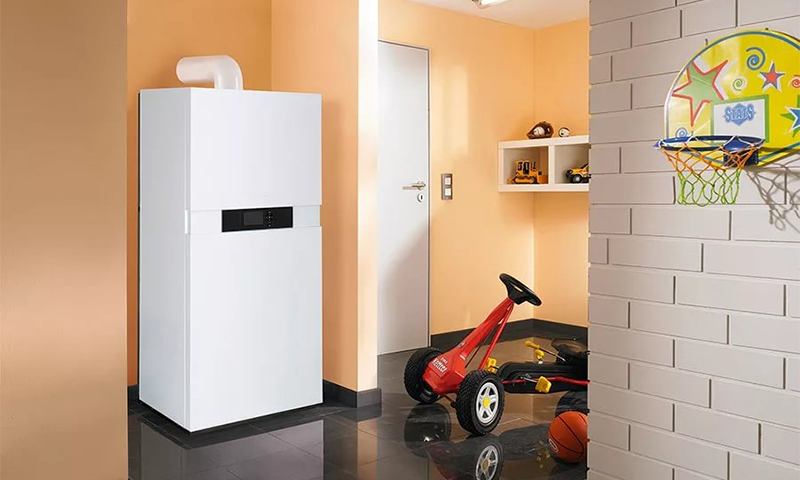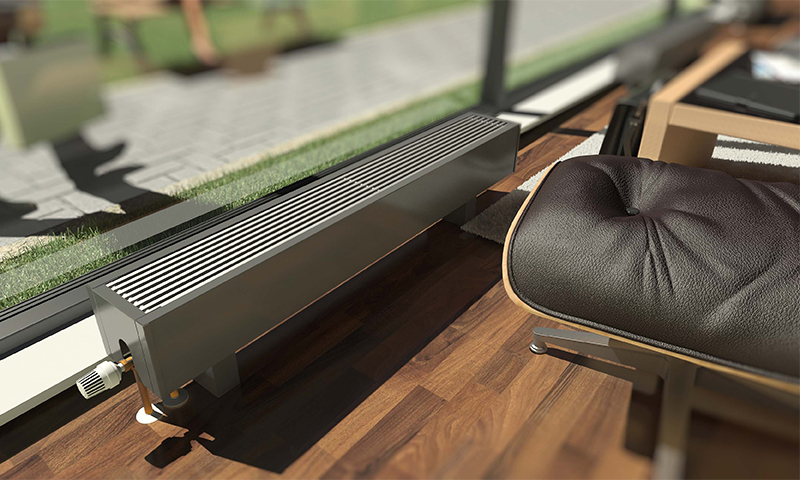A modern private house is inconceivable without a heating system, moreover, an autonomous led by a boiler: electric, gas, universal, liquid or solid fuel. Therefore, homeowners at one time the question arises, which of these units is the best. It all depends on each case. The selection takes into account the technical characteristics of the devices, the climatic conditions of living, the cost of fuel depending on the region, the warranty period and many other factors. After reading the article, armed with special knowledge, it will become much easier to buy the boiler correctly.

Content:
- The best manufacturers of boilers for heating a private house - which company to choose
- Device and principle of operation of boilers for heating a private house
- Varieties of boilers for heating a private house
- Options for choosing a boiler for heating a private house
- Which boiler to heat a private house to choose
- How much is a boiler for heating a private house
The best manufacturers of boilers for heating a private house - which company to choose
For the convenience of selecting the desired unit, the article is divided into full and short versions - the latter is provided in this section. Buyers are advised to read both options.
In the case of limited free time, it is proposed to get acquainted with the best manufacturers and immediately begin to determine for yourself the suitable equipment:
1. Vaillant
2. Protherm
3. Buderus
4. Stropuva
5. De dietrich
Device and principle of operation of boilers for heating a private house
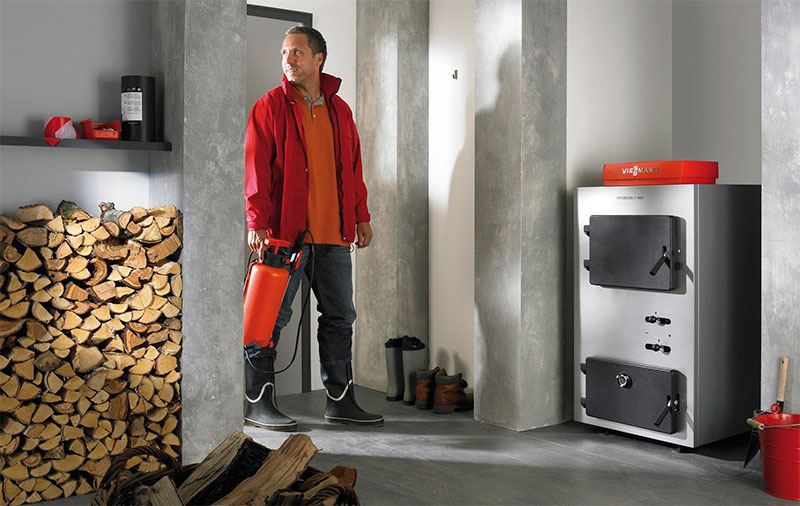
It is possible to create an autonomous heating system in a private house with the help of boilers: gas, electric, combined, solid and liquid fuel.
Gas and oil models are fundamentally the same: the combustion chamber, the burner, the heat exchanger, the control and monitoring units, and the output to the chimney or coaxial pipe. In solid versions, the grate, ashpit, water jacket and damper are added. Electrical modifications are significantly different - the heat exchanger in them is heated in a tank with heating elements, electrodes or inductive coils. The combined device is a "symbiosis" of the above devices.
Schematic diagram of the gas and diesel units: the fuel is fed into the combustion chamber; the burner is mechanically or automatically switched on and the fuel is ignited; the coolant is heated in a heat exchanger, after which it circulates in the heating system with or without a pump; in the presence of a boiler or 2 circuits, the water is also directed to collapsible points.
The operation of a solid-fuel device has its own characteristics - it is necessary to regularly load coal, firewood, or briquettes into the furnace and also clean the equipment from ash, tar and soot. When using an electric boiler, water heats up after making the settings and connecting the unit to the network. Combined devices function in the same way as others individually, only with switching to a specific type of fuel. For example, a special burner is installed to switch from firewood to gas, and a plug is inserted into the outlet for connecting the heating element.
Types of boilers for heating a private house
Gas boilers
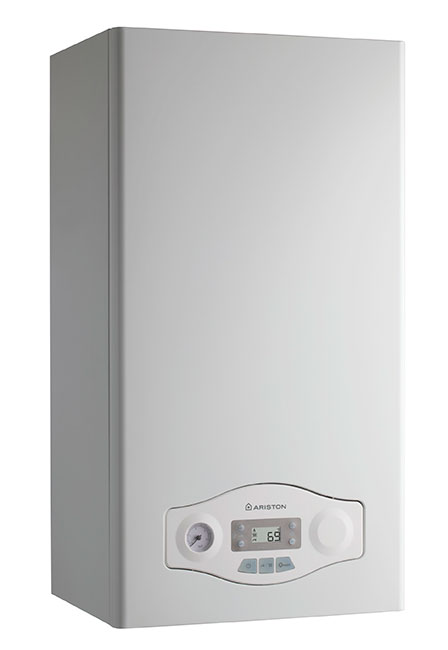
Gas-powered units are installed only if the corresponding highway is stretched near a private house.
Having a lot of similarities with other devices, they have enough individual characteristics. There are convection (conventional) devices that work according to the standard scheme with efficiency from 87 to 92% and condensing, in which steam energy is additionally used (efficiency ranges from 105 to 110%).They use both an open firebox that consumes oxygen from the inside, an atmospheric burner and exhaust gas through a standard chimney, and a closed chamber that receives air from the street, a turbo burner and a coaxial pipe.
If, in addition to heating, the DHW is additionally arranged, a 1-circuit model is purchased together with an indirect heating boiler or a 2-circuit version with 1 bithermic or 2 separate heat exchangers.
Benefits:
- high efficiency, reaching 110% in condensation modifications;
- energy independence of the apparatus;
- the noiselessness of atmospheric devices operating without an electric fan;
- possibility of additional hot water supply;
- rich product range;
- comparative cheapness of both units and fuel;
- comfort of use.
Disadvantages:
- energy dependence of units with built-in pump, electric fan, electronics;
- the need for an isolated room for appliances with an open hearth and a traditional chimney;
- noisy turbo models.
In the case of an open chamber and a chimney, as a rule, the boiler is mounted in special rooms of large houses - it is powerful, heavy, mounted on the floor. With a closed firebox and a coaxial pipe, a relatively light column is attached to the walls of mostly small-sized dwellings.
- See also: best gas boilers
Electric boilers
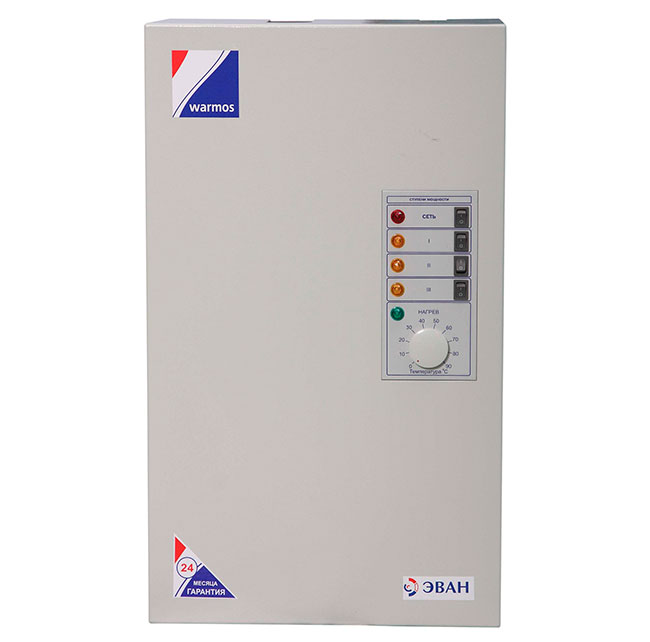
If there is no gas mains near the house, and there is no desire to mess around with firewood or tolerate the smell of diesel fuel, a heating system is arranged using an electric boiler.
You can choose among 3 modifications: tenova, electrode, induction. The first (most popular) works with the help of heating elements that heat water after the supply of electricity; the second operates due to the alternating current flowing in the fluid between the anode and the cathode; in the third, electromagnetic induction is used — the coolant temperature rises after passing the tube with the coil.
For the DHW device, the 1-circuit model + boiler or the 2-circuit version is similarly used - the performance for several analysis points must be from 15 l / s. When buying a device, be sure to take into account that the devices are sold both for 1-phase mains voltage (220 V) and 3-phase (380 V).
Benefits:
- compactness and comparative ease of installation;
- high efficiency, amounting to 93 ... 99%;
- possibility of fastening to the wall in any room;
- no need for a chimney;
- high level of security;
- the possibility of the device DHW;
- ease of use - minimal control after making the settings;
- large selection and availability of many models.
Disadvantages:
- volatility;
- high cost of electricity;
- inoperability when the current is off.
The electric boiler can be installed in any private dwelling, but because of the high cost of electricity, it is more expedient to use it in a small house or as an additional heating unit.
- See also: top electric boilers
Solid fuel boilers
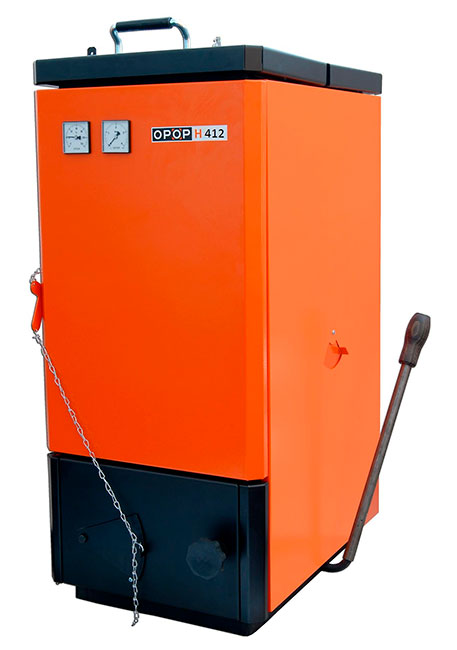
The reason for the device heating with a solid fuel boiler is the absence of a gas pipeline near the house and unwillingness to pay big money for the operation of the electrical unit.
Such devices are divided into models: classical, pyrolysis and long burning. Classical devices: consist of a combustion chamber, ashpit, heat exchanger, damper, chimney, 2 branch pipes and control and protection systems; work on coal, wood, coke, briquettes and pellets; loaded manually - small-piece fuel can be supplied automatically using a bunker. Pyrolysis boilers burn charcoal and gas, which are obtained as a result of the decomposition of firewood at a temperature of +200 ° C and more. In units of long-burning fuel is burned from top to bottom.
Such devices have: open and closed chambers; cast iron, steel and copper heat exchangers; 1- and 2-circuit versions.
Benefits:
- a significant part of non-volatile models;
- optimal efficiency - 80 ... 90%, although it happens and 55%;
- universality of the majority of devices;
- relatively low fuel prices;
- the possibility of creating a hot water supply system and functioning in a cascade;
- compatibility with other types of boilers;
- small ash and a long period of work in pyrolysis and long burning units;
ease of use.
Disadvantages:
- the need for a specially provided room;
- the need for regular bookmarking and cleaning;
- lack of comfort during operation.
Solid fuel boilers are suitable for country houses, but subject to low prices for coal, logs, briquettes and pellets. Well combined with other units, such as electric.
- Read also: best solid fuel boilers
Fuel oil boilers
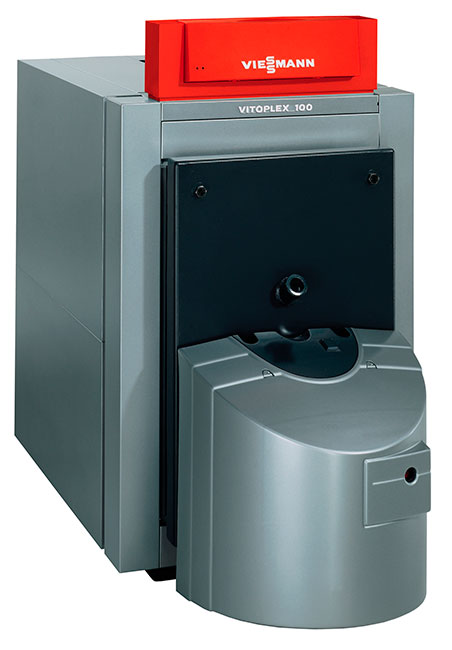
If the above options are not suitable for one reason or another, and the area of the house is more than 100 square meters, it is possible to use a liquid fuel boiler for its heating.
In many respects, it resembles a gas unit — primarily a complete set: a combustion chamber, a burner, a heat exchanger, an expansion tank, circulation pumps for fuel and water, a control system with a thermometer, a pressure gauge and sensors.
The equipment is installed in a separate room, fueled, for example, by a diesel engine from an external tank, consumes air from inside or from outside, and releases combustion products through a chimney or a coaxial pipe. In addition, it is ignited electrically or mechanically, it is equipped with a cast iron or steel heat exchanger, it can be either classical or condensing, as well as 1 or 2 circuit. The tank for fuel is usually made of stainless steel, insulated and buried in the ground near the house.
Benefits:
- high efficiency - from 80% to 103%;
- universality of application - diesel, used oil, kerosene, diesel fuel are used;
- the ability to connect the DHW system;
- high level of automation;
- Ease of Management;
- compact size;
- installation of the equipment does not require a special permit;
- long service life - at least 20 ... 30 years.
Disadvantages:
- the need for a specially equipped room and storage tank;
- constant presence in the rooms of faint odor;
- high total cost of the device, tank, fuel.
Fuel oil boilers are not very popular with homeowners, but if possible, cheaply “get” diesel or used oil, such units are installed and properly heat the room.
Combined boilers
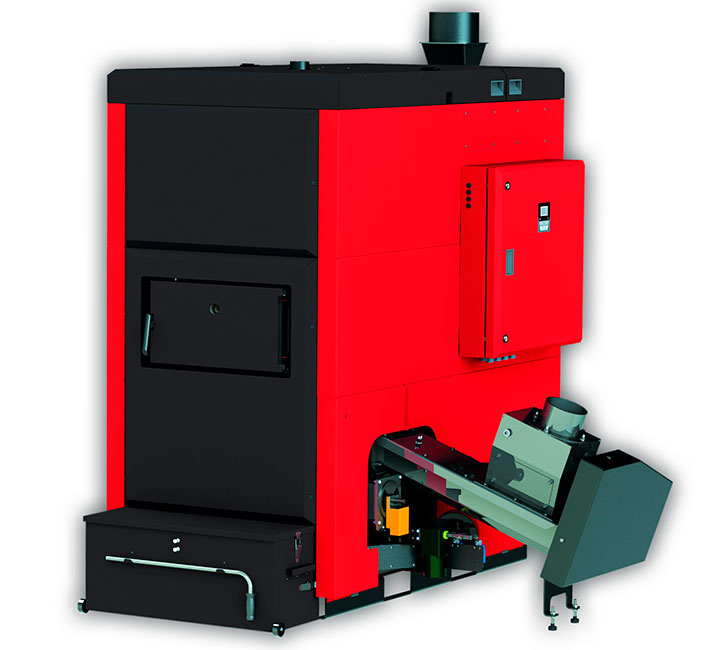
There are frequent cases: electricity is often turned off, gas has not yet been supplied, and firewood or diesel has run out - then it is better to buy a combined (universal) boiler to install a heating system.
Units of this type easily switch from one type of fuel to another, as a result, there are never problems with heating the rooms, and in the presence of 2 circuits or an indirect boiler - and with the supply of hot water.
There are such devices as multi-fuel, capable of alternately working with the help of heating elements, coal, diesel, natural and liquefied gas, and dual-fuel. Among the latter the most popular combinations: gas / diesel; solid fuel / gas; diesel / solid fuel; electricity / solid fuel - when switching to another mode of use, it is often enough just to change the burner. These devices are difficult to build, so they require proper and careful operation - otherwise expensive repair is guaranteed.
Benefits:
- universality - the use of several types of fuel;
- the possibility of automatic transition from the main fuel to the backup;
- no need to install different units;
- installation advantage over individual devices;
- optimal average efficiency;
- non-volatility of the devices
- the possibility of creating hot water supply;
- relatively high practicality of operation.
Disadvantages:
- the need for space for equipment and fuel;
- increased service requirements;
- the complexity of the design, causing expensive repairs.
If, for one reason or another, none of the energy sources is fully suitable, the way out is to purchase and install a combined boiler.
Options for choosing a boiler for heating a private house
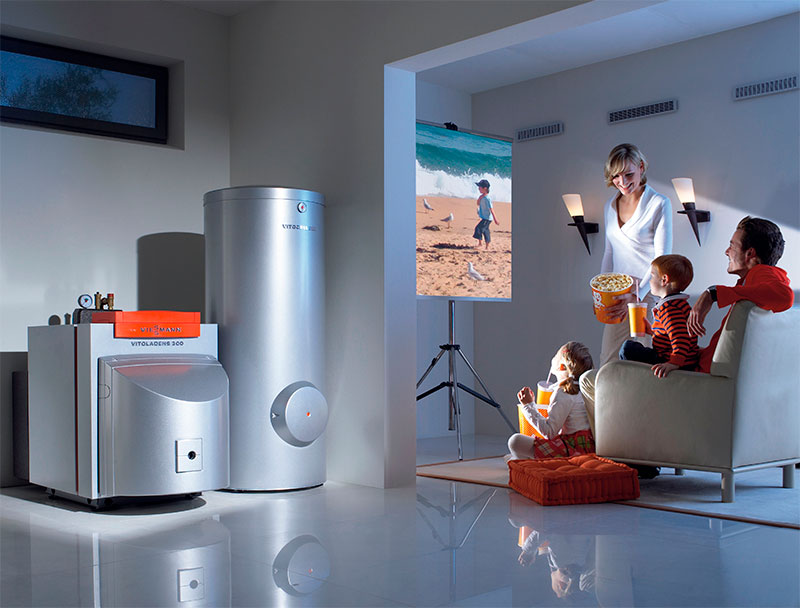
Before going to the store, first of all, is determined by the fuel, which will operate the device. Each fuel has its pros and cons, so the approach in this case should be individual. Considered the most practical gas. The country is also popular for firewood and coal.
1. The main parameter to which attention should be paid is power. It can be taken from the condition: for 10 m² of rooms with a ceiling height of up to 3 m, 1 kW + 20% of the reserve is needed. With a more accurate calculation, many factors are taken into account, for example, the area of external walls and the degree of their warming.
2. The power is tied to the efficiency - the higher it is, the smaller the waste of thermal energy. Maximum efficiency in condensation gas models (up to 110%), minimum - in solid-fuel modifications (usually 80 ... 90%, although there are 55%).
3. If, in addition to heating, it is planned to also produce DHW, a version with 2 circuits is selected. An alternative option, and more suitable for a private house - a 1-contour device + boiler indirect heating.
4. There are 2 variants of the working process: air intake through the open chamber, use of the atmospheric burner, removal of combustion products by the chimney; the use of a closed firebox and a turbo burner; the intake of air and smoke extraction by a coaxial pipe. Both ways are suitable for home, although the first is more acceptable.
5. Heat exchangers are: expensive cast-iron, which do not corrode, keep heat for a long time, but they crack with sharp fluctuations in temperature; cheaper steel that can withstand any thermal conditions, but rusting in the course of operation.
6. Units are divided into non-volatile, continuing to work when disconnected electrics, and those that stop when the network is de-energized. When choosing in this case, you need to assess the quality of energy supply.
7. In the variant with solid fuel, it is necessary to take into account that firewood is regularly loaded manually, and pellets are fed automatically through the bunker.
8. When buying an electric boiler, you need to understand: you will have to pay accordingly for maximum comfort - compared to other types of fuel, electricity is the most expensive. Among tenov, induction, electrode models, the first are the most popular - if only for the reason that heating elements are inexpensive and just change.
9. Serious attention is paid to management systems and control, including security. The last parameter is particularly relevant in case of gas pressure drops, power cuts and the onset of severe frosts.
10. When choosing equipment no less important: the name of the manufacturer, price, warranty period and the possibility of quality service.
Which boiler to heat a private house to choose
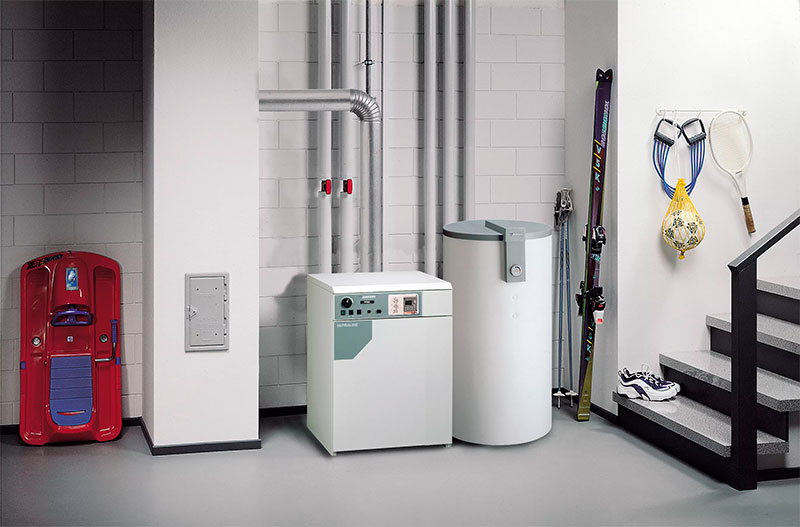
1. Boiler for a town house
In private houses, any of the above boilers are installed, but the specific choice is made on the basis of circumstances.
For large objects located within the city, the most rational will be to connect a single-circuit floor boiler to the gas pipeline and additionally arrange a hot water supply using an indirect heating boiler.
In private dwellings of smaller sizes, it is possible to mount the same unit, but a double-wall wall with a closed firebox. In addition, the heat exchanger is better to choose cast iron. If the water is soft, then - steel bithermal. When the role is played by comfort, and money does not matter, you can stop at the electric device.
2. Boiler for a country house
In the case of a house located outside the city limits, the options are the same, but if it is possible to connect to the highway.Otherwise, a good alternative is a solid fuel boiler, the fuel for which is selected on the basis of prices for coal, coke, firewood, pellets, briquettes in a particular region.
When determining the type of need to consider: logs can be cheap, but they will regularly have to throw in the furnace; more expensive pellets are loaded through the bin once a week. In the presence of diesel, waste oil or diesel oil, which are bought almost for nothing, it is advisable to give preference to liquid fuel modification. If different fuel is available at a price, a combination device is a good choice.
How much is a boiler for heating a private house
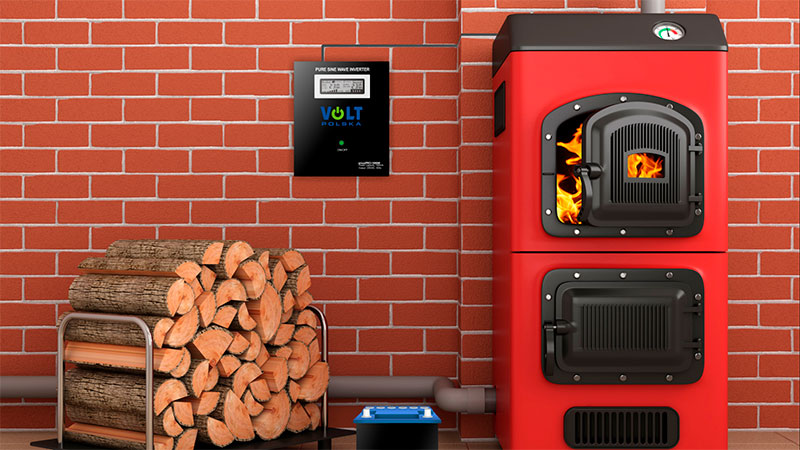
Below is the cost of the most popular heating boilers for private homes:
1. Gas - Protherm Cheetah 23 MOV: N = 9 ... 23 kW, efficiency 90%, equipped with two circuits and an open chamber, attached to the wall. 32.7 ... 39.1 thousand rubles.
2. Gas - Vaillant ecoVIT VKK INT 366: N = 11 ... 34 kW, efficiency of 109%, equipped with one circuit and an open chamber, installed on the floor. 140.8 ... 186.4 thousand rubles.
3. Electric - Protherm Slope 12 KR 13: N = 12 kW, Efficiency 99%, equipped with one circuit, connected to a 3-phase network, mounted on the wall. 31.7 ... 41.9 thousand rubles.
4. Solid fuel (wood, briquette) Stropuva S40: N = 40 kW; Efficiency 85%; equipped with an open chamber and one circuit, installed on the floor. 96.1 ... 122.0 thousand rubles.
5. Liquid fuel (diesel) - Buderus Logano G125 SE-25: N = 25 kW, efficiency 96%, equipped with one circuit and an open chamber, installed on the floor. 102.4 ... 139.3 thousand rubles.
6. Combined (gas-diesel) - De Dietrich GT 123: N = 21 kW; Efficiency of 96%, equipped with an open chamber and one circuit, is installed on the floor. 51.5 ... 109.0 thousand rubles.
Prices are valid for Moscow and the region as of August 2017.
It will be interesting to friends too





